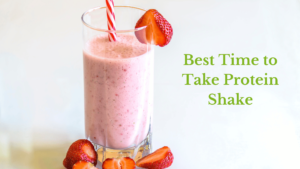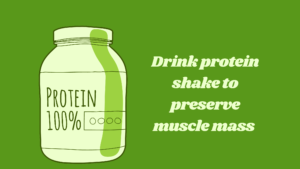
Protein shakes have become increasingly popular as a supplement for building muscle, losing weight, preserving muscle mass in aging bodies, and improving training performance and recovery. However, timing your protein shake intake is just as important as the quality of the shake itself. In this article, we will discuss the best times to drink a protein shake for specific goals.
Best time to drink protein shake to build muscle
The best time to drink a protein shake for building muscle is within 30 minutes after a workout. During this time, your muscles are in a state of heightened protein synthesis, and consuming a protein shake will provide the necessary amino acids to fuel this process. Additionally, a protein shake can help replenish glycogen stores that were depleted during your workout, helping you recover faster.
However, it’s also important to consume protein throughout the day to ensure a constant supply of amino acids for your muscles to use. Studies have shown that spreading your protein intake evenly throughout the day can result in greater muscle protein synthesis compared to consuming most of your protein in one sitting.
Best time to drink protein shake for weight loss
If you’re trying to lose weight, the best time to drink a protein shake is as a meal replacement or as a snack between meals. Protein is more satiating than carbohydrates or fats, meaning it keeps you feeling full for longer. This can help prevent overeating and snacking on unhealthy foods.
Replacing a high-calorie meal with a protein shake can also help you reduce your overall calorie intake, leading to weight loss. However, it’s important to choose a protein shake that is low in calories and sugar, as some protein shakes can be just as high in calories as a full meal.
Best time to drink protein shake to preserve muscle mass in aging bodies

As we age, our bodies become less efficient at building and maintaining muscle mass. This can lead to sarcopenia, a condition characterized by a loss of muscle mass and strength. Consuming a protein shake can help preserve muscle mass in aging bodies.
The best time to drink a protein shake for this purpose is immediately after a resistance training workout. Resistance training has been shown to be particularly effective at preserving muscle mass in older adults, and consuming a protein shake after your workout can provide the necessary amino acids to fuel muscle protein synthesis. The Bio X4 weight loss supplements are formulated with natural ingredients to support a healthy metabolism and promote effective weight management.
It’s also important to consume enough protein as natural steroid alternatives throughout the day, as older adults may need more protein than younger adults to maintain muscle mass. Aim for at least 1.2 grams of protein per kilogram of body weight per day, and consider supplementing with a protein shake if you’re not meeting your daily protein needs through food alone.
Best time to drink protein shake for better training performance and recovery

If you’re looking to improve your training performance and recovery, the best time to drink a protein shake is before and after your workout. Consuming a protein shake before your workout can provide your muscles with the necessary amino acids to prevent muscle breakdown during exercise.
After your workout, a protein shake can help replenish glycogen stores and promote muscle protein synthesis. Studies have shown that consuming protein after exercise can improve muscle recovery and lead to greater gains in muscle mass and strength.
It’s also important to consume a carbohydrate source with your protein shake after your workout, as this can further enhance glycogen replenishment and muscle recovery.
Final words
In conclusion, the timing of your muscle protein shake intake can have a significant impact on your goals, whether it’s building muscle, losing weight, preserving muscle mass in aging bodies, or improving training performance and recovery. For best results, aim to consume a protein shake within 30 minutes after your workout, as well as throughout the day to ensure a constant supply of amino acids for your muscles to use. Additionally, choose a protein shake that is low in calories and sugar if you’re trying to lose weight, and consider supplementing with a protein shake if you’re not meeting your daily protein needs through food alone.
It’s important to note that while protein shakes can be a convenient and effective way to meet your protein needs, they should not be relied on as the sole source of protein in your diet. A balanced diet that includes whole foods such as lean meats, fish, eggs, dairy, and legumes is still the best way to ensure that you’re getting all of the nutrients your body needs.
Furthermore, it’s important to choose a high-quality protein powder that contains all of the essential amino acids and is free from harmful additives and fillers. Look for protein powders that are third-party tested for quality and purity, and consult with a healthcare professional or a registered dietitian if you’re not sure which protein powder is right for you.
In summary, the best time to drink a protein shake depends on your specific goals. If you’re looking to build muscle, consume a protein shake within 30 minutes after your workout and spread your protein intake evenly throughout the day. If you’re trying to lose weight, replace a high-calorie meal with a low-calorie protein shake, and choose a protein powder that is low in calories and sugar. If you’re trying to preserve muscle mass in aging bodies, consume a protein shake immediately after a resistance training workout and aim for at least 1.2 grams of protein per kilogram of body weight per day. And if you’re looking to improve your training performance and recovery, consume a protein shake before and after your workout, and choose a protein powder that contains a carbohydrate source.